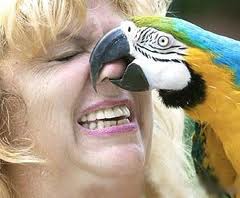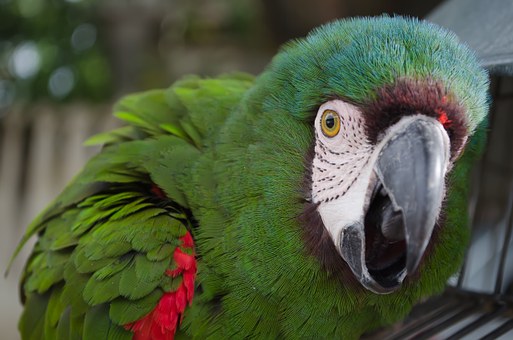If you desire she also does behavior consulting, pretty reasonable and by phone.
Here is more of her advice and I will link article:
https://blogpamelaclarkonline.com/2019/01/31/parrot-and-start-buttons/
"
Antecedent Changes Only for Biting
Biting is different. The best strategy to resolve biting is to avoid it – identify the antecedents and change those. Many people will advise consequence changes, such as a time out, when a bird bites. This never works. For a consequence change to work, there must be
contiguity. This means that, for a consequence to influence behavior, it must occur
very quickly after the behavior occurs.
If you try to give a parrot a “time out” in the cage for biting, by the time you get the bird into the cage, contiguity has been lost. The consequence occurs too long after the bite for it to have any meaning to the bird. I just did a consult with a client who has been using time-outs for years and her bird was still biting frequently. By focusing on antecedent changes, the problem has now almost resolved.
Avoid the Situation and Build Behavior to Resolve Biting
If your bird bites you, you must avoid the bites by changing the antecedents. If your bird bites your earrings when on your shoulder, then don’t allow him on the shoulder anymore. If he bites when you try to pet him, then don’t pet him under those circumstances anymore. If he bites when you change out food dishes, then teach him to station on a perch in the cage or remove him from the cage completely when you feed. If he bites when you put your face close to him, then don’t do that anymore.
At the same time, you must also begin offering positive reinforcement for
all cued behaviors. This helps to build compliance at the same time that you remove opportunities for biting. The combination of these two strategies works every time.
Just Read the Body Language!
People will typically advise you to change the antecedents by carefully observing your parrot’s body language. This is good advice, but often doing so is easier said than done.
If you don’t have years of experience with a variety of birds, it can be hard to recognize and interpret body language accurately. New World birds, such as Amazons, macaws, and conures, are often the easiest to read. Their body language tends to be more overt, if not dramatic. However, the African grey may only slightly raise the feathers on his shoulders to alert you that a bite is coming. His is not so obvious. Your cockatoo might chatter his beak, but whether he means to bite or have sex with you may not be immediately evident.
Reading body language is a skill that develops over time. Just telling someone to “read the body language and you won’t get bitten” may be of little help. The ability to read body language requires a good deal of sensitivity and that level of sensitivity will likely take practice and dedication to develop. It has taken me
years of work to be able to spot every message my birds are transmitting.
Most humans aren’t very good at reading the body language of other people, much less that of animals. Expecting them to be able to read their parrots’ successfully, even if it has been described to them, may be simply expecting too much. Further, many parrots learn to mask their body language before biting for one reason or another.
The Function of Aggressive Displays
Behavior has function. This means that your parrot does things for a reason. While some biting results simply from a heightened state of arousal, the function of most biting behavior is either to make us stop doing what we are doing or to get a reaction from us. However, biting is not a natural behavior for most species, and therefore most individuals will initially display some signs that a bite is on the way, as the grey above demonstrates. If the owner ignores these signs time and time again, the bird can learn to simply save his energy and go straight for the bite.
So, what if we did something even better? What if we developed a form of communication with our birds that allowed them to indicate to us when they wanted to interact – a sort of permission they could give us to forge ahead?
The Benefits of Start Buttons
We can offer them a
Start Button. This concept is useful for any species. It is especially useful for animals who suffer from fear or aggressive tendencies."





